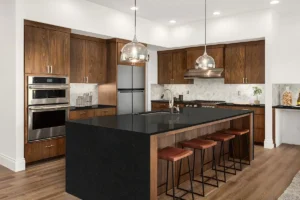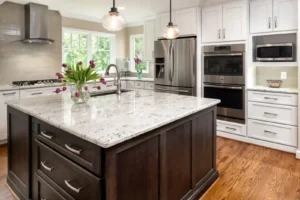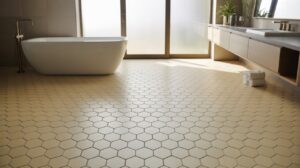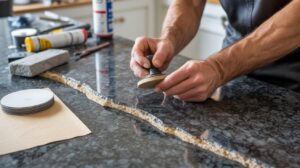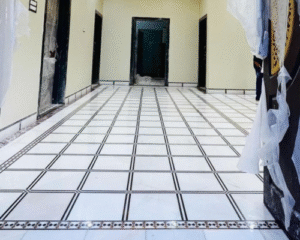You restore your granite’s natural shine by first giving it a thorough cleaning, then filling any chips or scratches, sanding the surface smooth with diamond pads, polishing it to a glossy finish, and finally sealing it to lock in protection, this simple sequence brings back that fresh-from-the-factory look. Granite countertops add timeless elegance and toughness to your kitchen, but everyday spills and utensils can dull their sparkle over time. By following these steps, clean, repair, sand, polish, seal, you’ll not only refresh the stone’s beauty but also extend its life. Whether you tackle it yourself or call in professionals, you’ll enjoy a surface that looks as stunning as the day it was installed.
What Does It Mean to Resurface Granite Countertops?
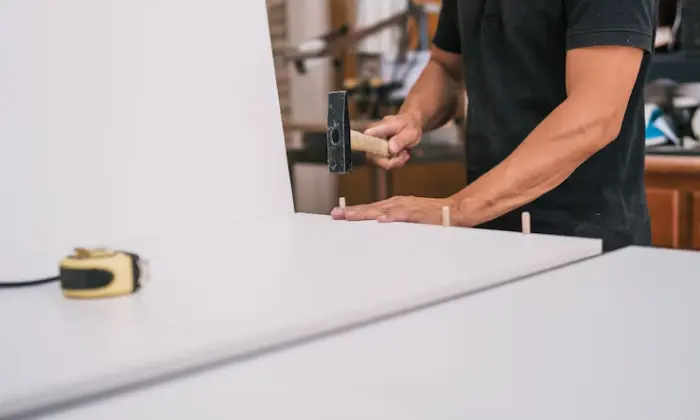
Resurfacing granite countertops involves restoring their surface to its original smoothness and shine by removing imperfections such as scratches, stains, or dull areas. This process typically includes cleaning, polishing, and sealing the granite to rejuvenate its appearance and protect it from future damage.
Table of Contents
ToggleThe key difference between resurfacing and refinishing granite countertops lies in the depth of treatment. Resurfacing focuses on the surface layer, addressing minor wear and restoring the countertop’s shine. Refinishing, on the other hand, involves more extensive work, such as grinding down the stone to remove deep scratches or significant damage, followed by polishing and sealing.
Can You Resurface Granite Countertops Yourself?
DIY granite countertop resurfacing is feasible, but it requires time, patience, and the right tools. Homeowners can achieve decent results if they’re careful and follow the proper steps. However, the process can be challenging, especially for those without experience working with granite.
Necessary Tools and Materials
To resurface granite countertops yourself, you’ll need tools and materials such as
- Diamond polishing pads
- Granite cleaner
- Polishing compound
- Granite sealer
- Soft cloths
- Protective gloves and eyewear
How to Resurface Granite Countertops: Step-by-Step Guide
Step 1: Cleaning and Preparing the Granite Surface
Begin by thoroughly cleaning the granite countertop. Use a granite-specific cleaner or a mild dish soap mixed with warm water. Wipe down the entire surface with a soft cloth, ensuring all dirt, grease, and residues are removed. Let the countertop dry completely before moving to the next step.
Step 2: Repairing Chips, Cracks, and Other Imperfections
Examine the countertop for any chips, cracks, or scratches. Use an epoxy resin or a granite repair kit to fill in these imperfections. Follow the manufacturer’s instructions, and allow the repairs to cure fully. Once dry, gently sand the repaired granite countertops areas to level them with the rest of the surface.
Step 3: Sanding the Granite Surface for a Smooth Finish
Using diamond polishing pads or a handheld sander, start sanding the granite surface. Begin with a coarse grit (e.g., 100-grit) and gradually move to finer grits (up to 3000-grit) for a smooth finish. Sand in circular motions, applying even pressure across the surface. Wipe away dust between grit changes.
Step 4: Applying a Granite Polishing Compound
After sanding, apply a granite polishing compound to restore the stone’s shine. Using a soft cloth or a polishing pad, buff the compound into the surface in a circular motion. Continue polishing until the granite achieves a glossy, uniform finish. Wipe off any excess compound with a clean cloth.
Step 5: Sealing the Granite to Protect It from Future Damage
The final step is sealing the granite to protect it from stains and future wear. Apply a granite sealer evenly across the surface, following the product instructions. Allow the sealer to penetrate the stone for the recommended time, then wipe off any excess. Let the countertop cure for the specified period before use.
How Much Does It Cost to Resurface Granite Countertops?
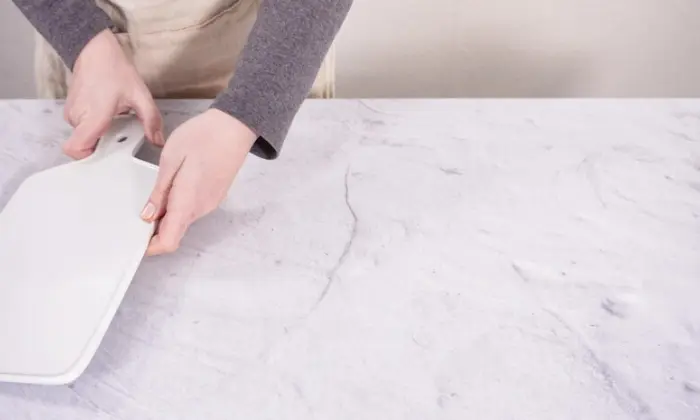
The cost to resurface granite countertops can vary depending on whether you choose to do it yourself or hire a professional.
DIY Resurfacing Costs
If you opt to resurface the countertops yourself, the cost is generally lower. You’ll need to purchase materials like diamond polishing pads, granite cleaner, polishing compound, and sealer, which can range from $100 to $300 depending on the quality and quantity of supplies. If you don’t already own necessary tools like a sander, renting or buying one could add to the expense.
Professional Resurfacing Costs
Hiring a professional to resurface granite countertops typically costs between $300 and $1,200, depending on the size of the area, the condition of the granite, and the local labor rates. Professionals bring expertise and specialized equipment, which can lead to a higher-quality finish and longer-lasting results.
Resurface Granite Countertops to Restore Their Natural Luster
When daily use has dulled your stone’s shine or minor scratches have stolen its sparkle, it’s time to resurface granite countertops and bring back that showroom-worthy gleam. Our team at SF Marble & Granite Inc. gently sands away imperfections with diamond polishing pads, buffs on a premium polishing compound, and seals the surface to lock in protection giving you a smooth, glossy finish that lasts. Whether you’ve spotted faint etches around the sink or notice a dull patch by the stove, professional resurfacing saves you the cost and hassle of a full replacement. Plus, when you’re ready for a complete kitchen refresh, ask us about Countertops Installation in Lowell to pair your newly gleaming granite with the perfect complementary surface.
Why Choose SF Marble Granite for Your Granite Countertop Resurfacing Needs?
Choosing SF Marble Granite for resurfacing granite countertops needs ensures you receive top-quality service backed by years of experience and expertise. Our team of skilled professionals is dedicated to restoring your granite surfaces to their original beauty, using the latest techniques and high-grade materials. We understand the unique characteristics of granite and tailor our approach to deliver a flawless finish that enhances the longevity and aesthetic appeal of your countertops.
At SF Marble Granite, we prioritize customer satisfaction, offering personalized service to meet your specific needs and preferences. Our commitment to excellence means you can trust us to handle your resurfacing project with precision and care, providing results that exceed expectations. Whether you’re looking to refresh the look of your kitchen or maintain the value of your home, SF Marble Granite is your trusted partner for all your granite countertop resurfacing needs.
Conclusion
Resurfacing granite countertops is an effective way to restore their original shine and beauty, addressing issues like scratches, dullness, and minor damage. Whether you choose to tackle the project yourself or hire a professional, to resurface granite countertops you can extend the life of your countertops and keep them looking their best.
If your granite surfaces have lost their luster, consider resurfacing as a viable option to rejuvenate them. It’s a cost-effective solution that can make your countertops look new again, adding value and elegance to your home.
For the best results, trust the experts at SF Marble Granite. Contact us today for professional granite countertop resurfacing services that deliver lasting beauty and quality.
FAQs
How long does a professional resurfacing take?
Most kitchens can be resurfaced in just one day, our crew cleans, repairs, sands, polishes, and seals, then lets the sealer cure overnight so you can use your counters by morning.
Will resurfacing remove deep chips or cracks?
Minor chips and hairline cracks can be expertly filled and blended, but deep damage may require more extensive repair or a local patch.
How often should granite countertops be resurfaced?
With proper care, every 5–10 years is typical; regular sealing and gentle cleaning in between helps preserve the finish.

